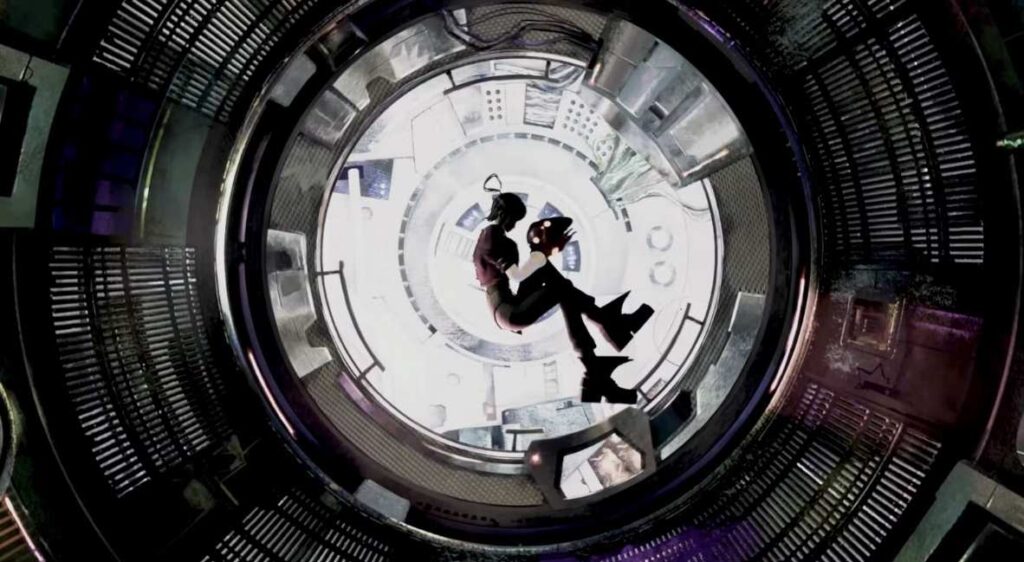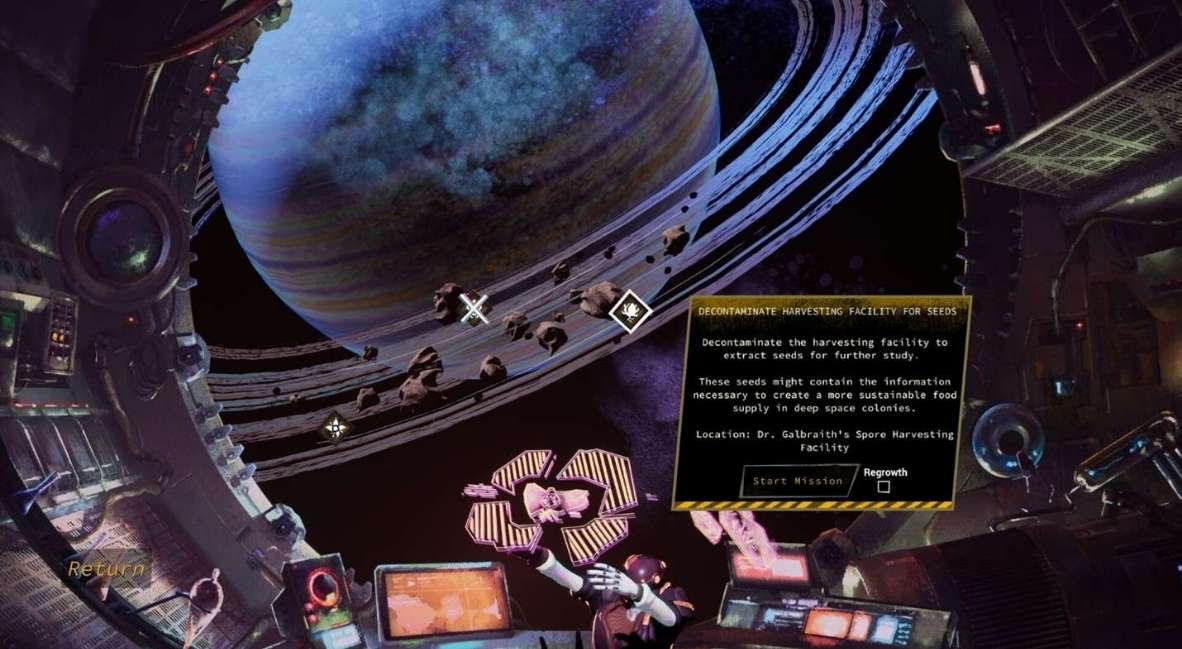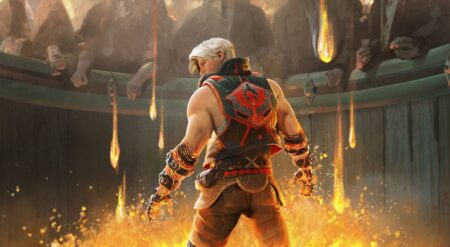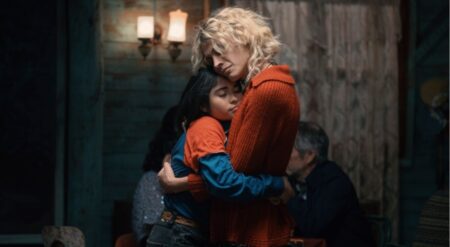When it comes to genre storytelling, there is something cathartic and magical about telling a deeply human story through elements of science fiction. Ambrosia Sky, developed by Soft Rains, does just that. With a narrative about coming home, Ambrosia Sky follows Dalia, a field scientist belonging to an enigmatic order pursuing human immortality. Dalia is returning home, dispatched to a farming colony on Saturn’s outer rings.
But when she arrives, Dalia finds it abandoned and overrun by hostile fungi. Everyone she knew and loved is either dead, missing, or perhaps complicit in the growing fungi. As Dalia, you will work to cleanse the contamination, discover the truth, and lay the dead to rest.
With Act One out now, we spoke with Soft Rains developers, Narrative director Kaitlin (referred to as Kait throughout) Tremblay and Soft Rains Studio Head and Creative Director Joel Burgess, about the mark they hope to leave with Ambrosia Sky, their approach to telling a personal story in outer space, and why they chose science fiction as the genre vehicle for Dalia’s story.
This Ambrosia Sky interview with Soft Rains devs has been edited for clarity and length.
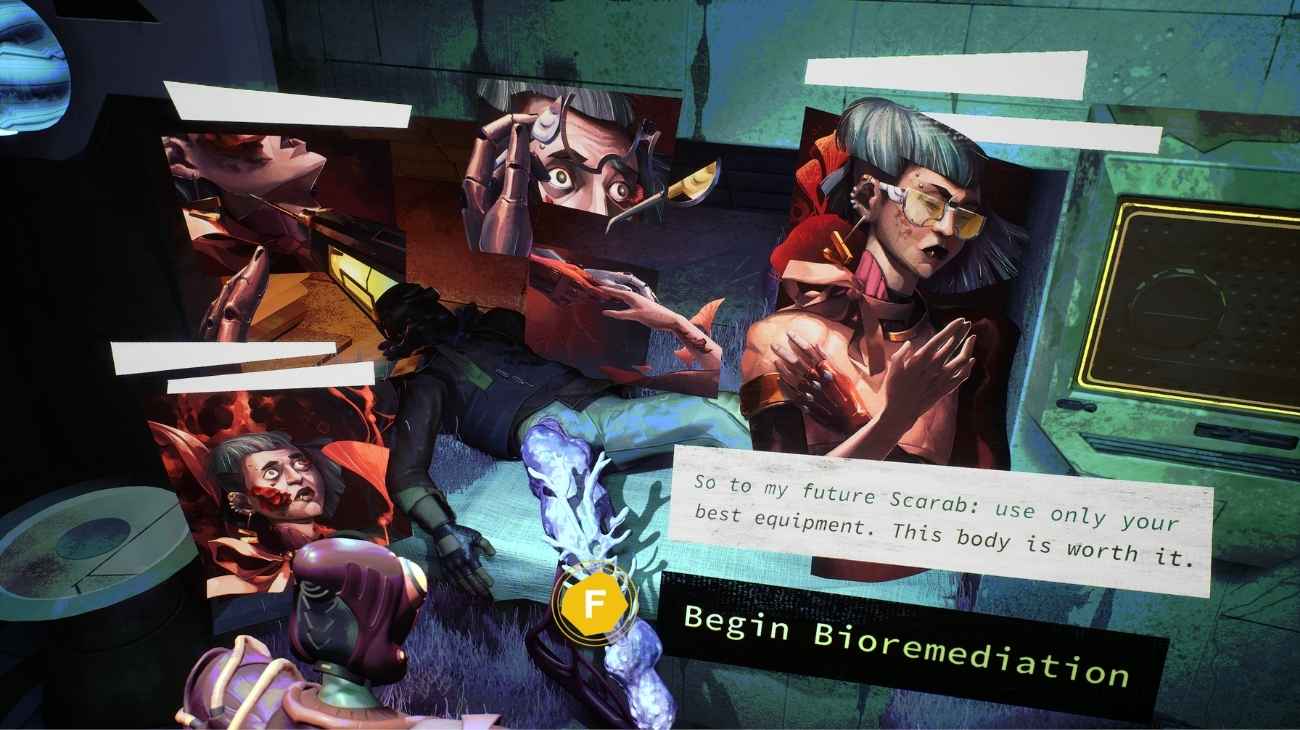
When it comes to picking up a new title, visuals make a huge impact, even if we like to say that we don’t pick up a book because of its cover. For Ambrosia Sky, a video game with a unique visual art style and vibrant color palette, art was the first thing on our mind as we began our conversation. So we asked a simple question: how did Soft Rains land on the near-psychedelic look for the title?
Joel Burgess responded, “At the earliest days, I wouldn’t say that we had an idea of the art direction, but we did have an idea that we wanted something that was going to be colorful. We thought a lot about mushrooms, actually…. Annihilation was [also] a visual reference for us as well. But it also came from a place of just business pragmatism.”
“Whenever [Ambrosia Sky] comes out, there is probably going to be a lot of other first-person horror adjacent sci-fi games that are going to have a certain type of look, and we didn’t want to be forgettable [visually]. It took us a while to figure out what that actually meant. We were working with folks on concept art and stuff in the first several months of Ambrosia Sky, and we knew [set] things about the game,” he continued.
Adding, “We knew we wanted this sort of beautiful grotesquerie about it. We knew we wanted this use of color and the sort of just violent riot of color of corals and mushrooms and stuff like that. But it wasn’t until we started working with our art director, Adam, that it started to become coherent. I think it’s really a testament to Adam as an art director, not just an artist in his own right, that he’s been able to come to the project and then translate his style and these sort of visual pillars we were going for, the entire art team for Ambrosia brought it together.”
Bright pinks and rich teals, piercing red and yellow, when you look at a still from the game, you know it’s Ambrosia Sky. But the visual richness is enhanced by a narrative that digs deep into grief and regret, and the concept of home that strikes at the core of what many of us go through when moving away. And ultimately, coming back. Still, that is a topic that you don’t immediately think about sci-fi for.
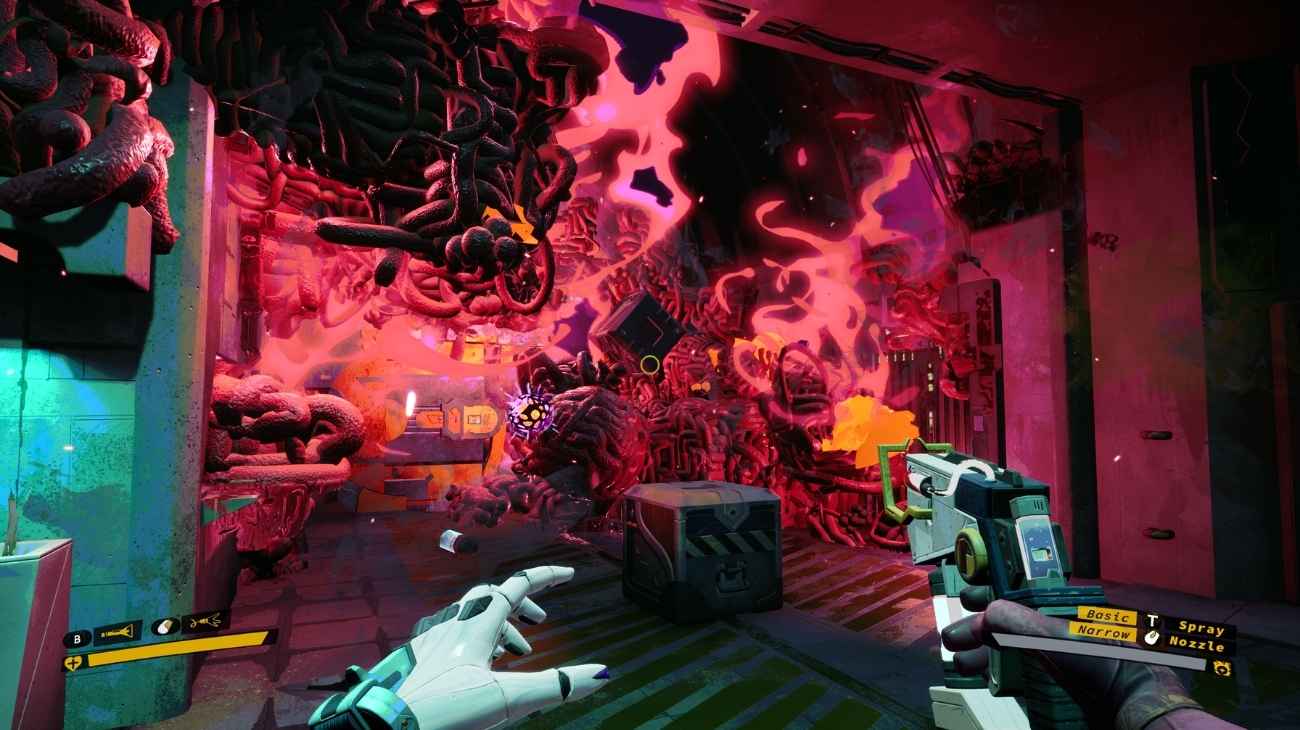
For the Soft Rains team, the story reflected a stage of life that many of them were at. Narrative director Kait Tremblay explained, “There are a couple of reasons why we wanted it to be a homecoming story. One is just that I think at that stage of my life in particular. For a bunch of us, not living in the place where we were born and missing family [has led us] to feeling this bit of revisiting our relationship to our hometowns. That kind of story was inherently on my mind early on.”
She continued, “From a narrative design point of view, it gave us this really good lens to be able to gesture to the player what was normal and what wasn’t normal. Because Dalia is from here, she can call out ‘this is normal’ and ‘this isn’t normal,’ Because we are building this more surreal, stylized world that has different rules than our world as we know it.”
As much as Ambrosia Sky’s narrative brings an emotional impact for those thinking about their former homes, it also serves to help the player understand a new world, and what is a threat versus what isn’t. Tremblay added, “It was useful having somebody from the place who can then speak to those things and help shepherd the player through what is off kilter and what isn’t. That was the design reasoning behind making it homecoming.”
But design is only as strong as function, and for the narrative team, the emotion from the homecoming story was also important. “Then we layered that on top of the really interesting story of if we want to talk about acceptance and death and personal responsibility [that comes from] having somebody who left and came back; someone who has to say goodbye and reckon with these emotions of what it means to leave and then come back to a place where disaster has struck,” she said.
Ending with, “I just think it’s really evocative. It adds a lot more grounded touch points to how she moves through the space as a protagonist. That just lends a little bit more intimacy to the story.”
Dalia’s story is about coming home, but also the regret and grief that it sparks.
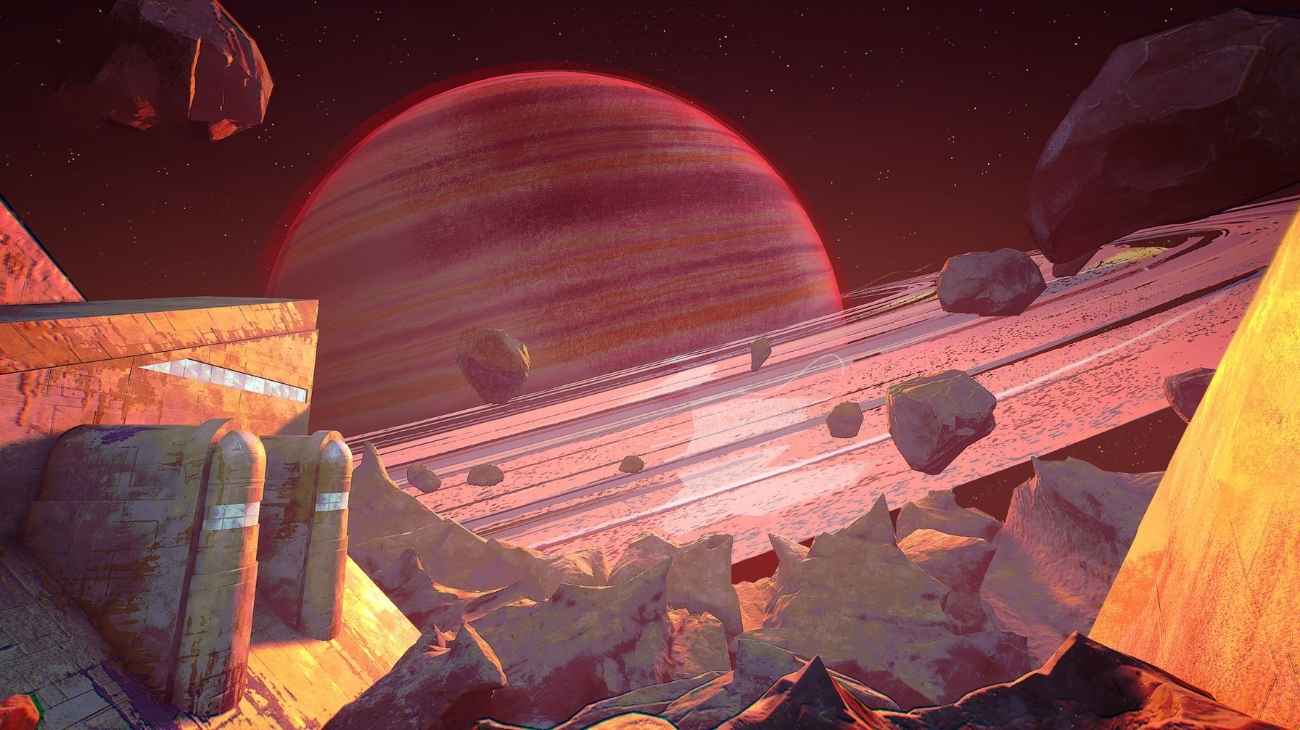
And that intimacy was palpable from the very start of Ambrosia Sky. It’s easy to think about leaving home as just a part of life, but when you do finally come back, there are things you have to deal with. It can be large things, like not being home when a relative passed away, or small, like coming back home to see that your parents have sold a house, or even still, seeing a building that meant so much to you in your childhood become paved over for a parking garage.
None of these changes may be science fiction in nature, but they’re captured in how Dalia comes back to the second ring of Saturn. But to craft Dalia’s connection to the Cluster, Soft Rains needed to define what it meant to come to it to begin with.
Joel Burgess explained the connection, “We thought and talked a lot about the founding of the cluster and what would bring humanity to this place, and why Saturn and all of this. And in those early days, we thought and talked a lot about Dalia herself and the members of this cluster community being a diaspora [community] and this idea too of travel and outer space taking time. In our lives today, depending on your circumstances and where in the world you are, there’s almost a feeling of impermanence and leaving a place.”
“I grew up as a military brat,” Burgess said. “And so moving around is not a big deal. You move, and you go, and you can always go back. And in the world of the Cluster, that is actually a big deal.” The big deal that Burgess is referring to is the fact that, in the game, like in space, traveling takes time. And in the time it takes you to leave, to live, and come back, your home has more time to change. And what feels commonplace in our world becomes a huge decision for Dalia. Sometimes, you can’t come back, and even if you do, nothing is there anymore.
He continued, “I think it’s one of the things that hopefully has made the story of Dalia relatable. Whether you’re a member of a diaspora [community] or if you’re just a person who left your hometown, this idea of ‘I can always go back,’ and then when you do go back, things are changed, and it’s too late to think, it connects.”
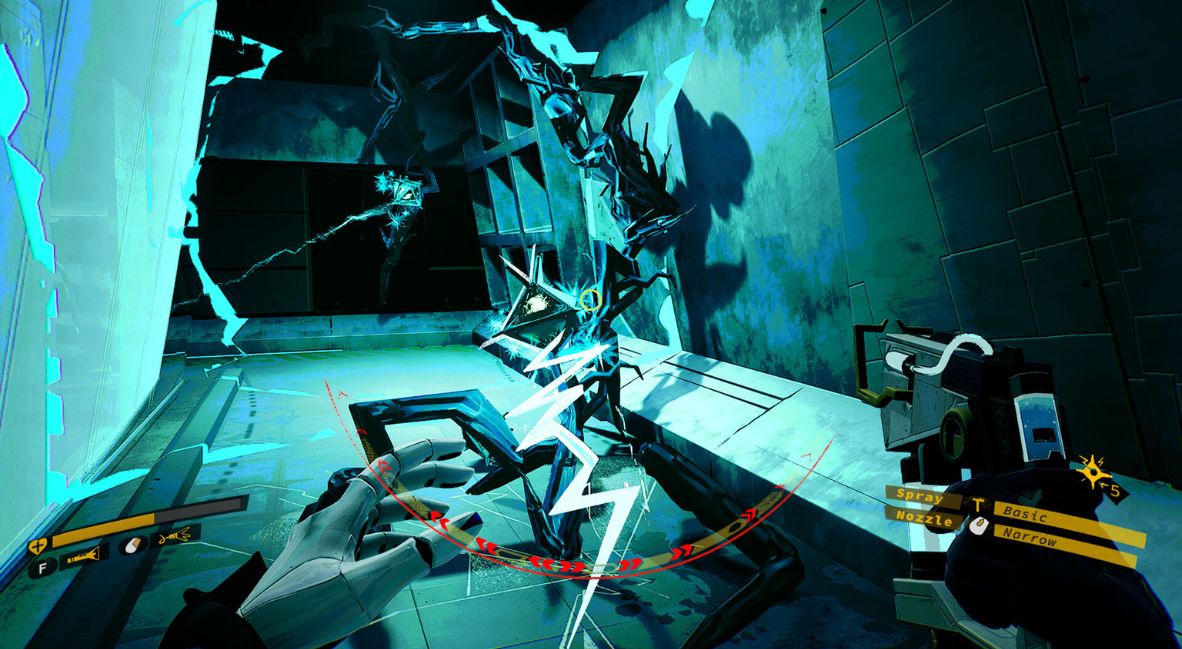
The important element to this conversation is that Dalia isn’t just returning to her hometown. She is instead returning to a cluster that has been devastated, and many of the people who lived there have died now. This isn’t just a place that looks different to Dalia; it’s a place of grief.
Kait Tremblay said, “I think a lot of [Ambrosia Sky] is two stories. It’s Dalia’s story, but it’s also the story of the people who lived here and who died. Dalia is able to have memories of them, but she has to update those memories in real time since she has been gone for 15 years. She thinks, ‘They’ve developed a life without me.’ It just adds a little bit more texture to these [side] characters as well. They’re not just of the present; they also have a past. And so, she and you have to reconcile with both those aspects of them.”
Much of Ambrosia Sky’s storytelling relies on the player understanding the weight that comes with returning home, and it maps that out beautifully. Coming home means something different to everyone, and through sci-fi, the Soft Rains team is able to hit at players’ core emotions, while showcasing it all in a genre setting.
But one thing that the game captured for me, as someone who may have left my hometown, but will be just 45 minutes away for the rest of my life, is what happens when you don’t leave. Especially, being from Texas, “I’m sorry” is often what I get when I answer the question about where I’m from. But the reality is that I don’t want to live anywhere else; I want to make my home better, and I’m proud of it. But how do you capture the complex feeling about home in a cluster around one of Saturn’s rings?
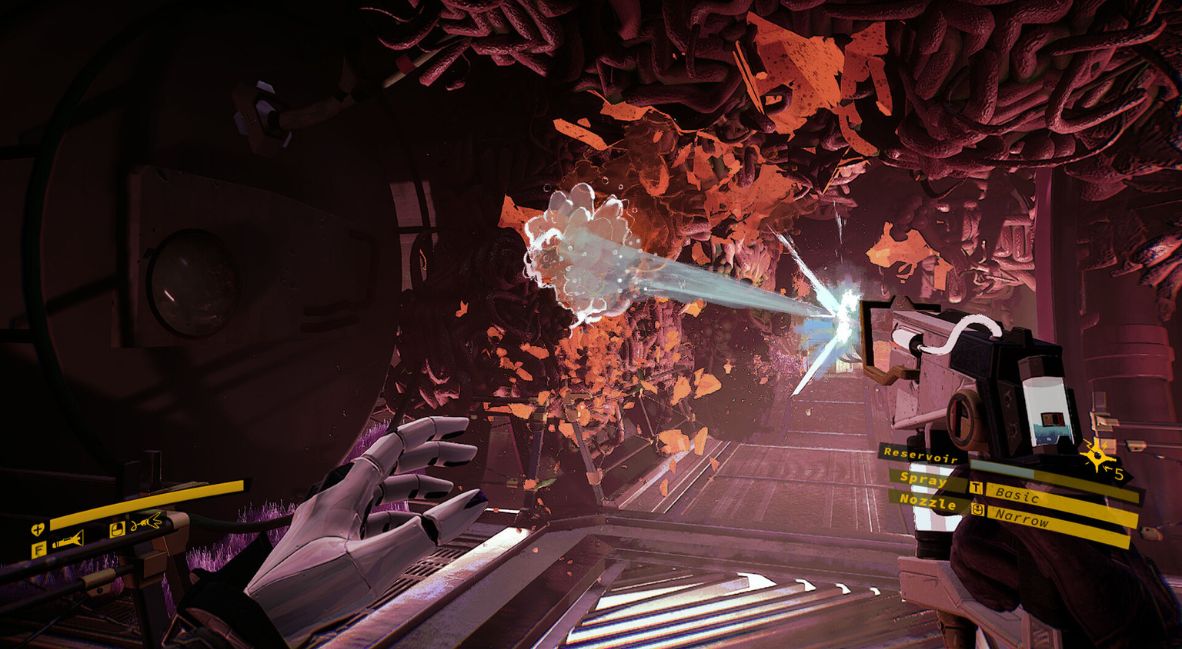
After explaining this to Tremblay and Burgess, I asked about how they tackled that in the storytelling. Tremblay explained how she pulled her own hometown into Ambrosia Sky, “I have a small Canadian hometown. It doesn’t have any notoriety outside Canada. I often get similar things, too. And the thing that I’m always really proud of when I think about my hometown is the people who stayed and who have built up part of the culture and who have made families and given it the sense of identity that is multifaceted, and that’s a lot of what I wanted to try to honor in Ambrosia Sky.
“Especially coming from a blue-collar industrial town, there’s so much about the lives of people in these places that I think is really beautiful and interesting,” She continued. “Part of it was like an homage to those types of spaces for sure, and so it’s really cool to hear you saying that that’s clicking for you.”
Tremblay switched gears to sci-fi, saying, “As for the genre side of it, I love genre, and I love finding that space between what are the tropes of genre that you need to play with and where can you subvert them and have fun or let them speak to each other in different ways. I really love genre mashing. I really love finding atypical ways into genre.”
“For me, what was really exciting about working in sci-fi was not going the route that people might take: ‘Let’s do hard sciences, figure out the technology.’ For me, it was ‘How can we take the tropes and the trappings of sci-fi, but infuse that with folklore and medieval medicine and this historical mythological approach,’ right?”
But space horror, or rather science fiction in space, tends to focus on the dark. For Soft Rains, they wanted to add warmth. Tremblay continued, “There’s a lot about this game that is mythical or spiritual, and adding this kind of warmth to sci-fi was really fun and exciting. And it’s not that sci-fi isn’t warm, but I think a lot of the prevailing immediate thoughts about sci-fi are a little colder, a little darker, a little more sterile.”
Ambrosia Sky adds warmth to the often sterile view of space in science fiction.
Joel Burgess jumped in, the conversation flowing naturally between the two developers, “I have a specialty in world and setting, and that’s one reason why I think we’ve worked well and enjoyed working together so much. I’m somewhat interested in stuff like how faster-than-light travel works. There’s this whole thing about how it works, but it doesn’t really matter in the story; it’s a rule of the world that we have.”
“One of the places where I think it really connects and connected for us, creatively building this out, was having kind of the lore in our minds of how this place was settled. Our answer was that this place was settled because humanity found the mushrooms to be a basically sustainable food source off planet. This is the linchpin of deep space exploration and survival,” he continued.
Burgess continued to expand on worldbuilding. Where Kait Tremblay discussed emotion and warmth, Joel Burgess spoke about the tiny details of Dalia’s world that all connect to make Ambrosia Sky’s narrative, just by being where it takes place.
He explained the complexity of defining how the mushrooms were found by the first humans, mentioned trying to give a motive for settling the world, and defined the search as a suicide mission. And then, he turned the conversation back to Dalia, who he says is the third generation of humans on the Cluster, and how that defines her parents as on the frontier of the Cluster’s founding.
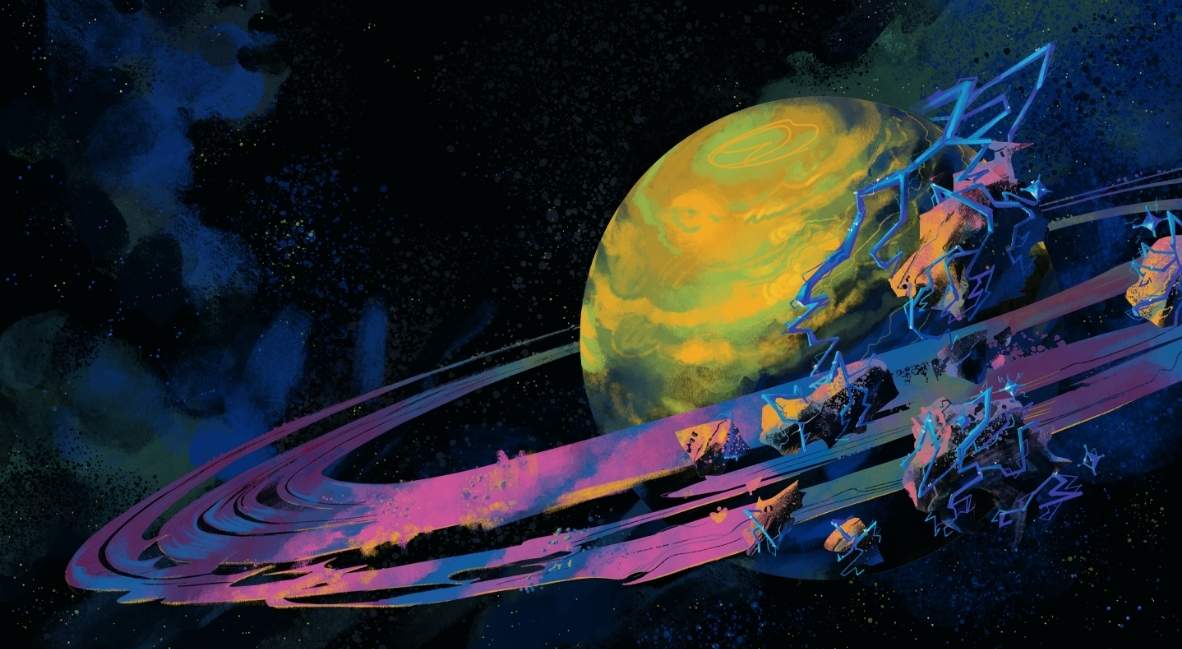
“We are able to kind of create these rules for ourselves in the sci-fi space,” he explained, “But the rules that we chose to create are largely around the game were influenced by technology, but they’re really created by this idea of community and the place and the sort of social infrastructure of human expansion off planet.”
“That’s where we get into things around talking about the blue-collar town, right? It’s really important that Dalia’s parents’ generation is in this boom time, but then that boom has come to an end,” Burgess said, diving deeper into the small choices made for the world next.
“You have sort of an infrastructure that has moved on, and that influences what we talked a lot with our composer Greg about the music that would be on Dalia’s mixtape, and it would be much darker, sort of bygone generation stuff, whereas the generation before it would be glorifying and aggrandizing the frontier culture. It might have this grand old opry for them, and she would have liked The Cranberries. So, we created rules for ourselves that sort of stitch this idea of community and character storytelling over just pure sort of aspirational sci-fi.”
“The game helped me really just take some of the pressure off and back away from my perfectionism a bit. It’s better to have something imperfect that people can connect with than something perfect that they’ll never get to see.”
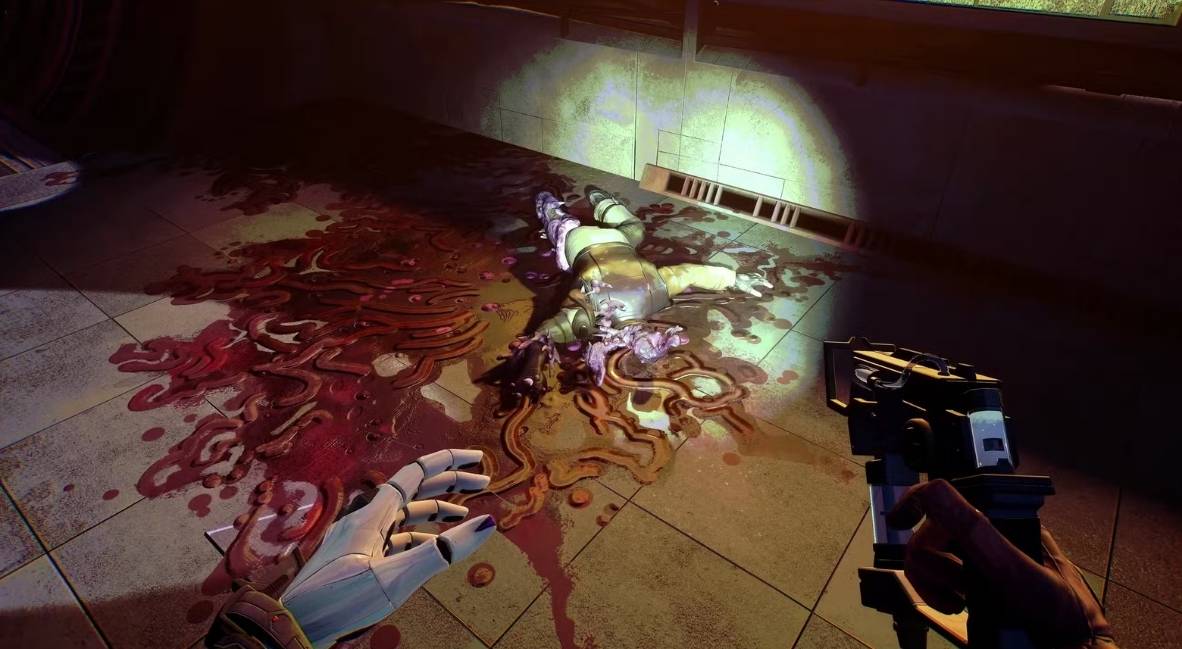
At this point in the conversation, both Kait Tremblay and Joel Burgess have discussed what they put into the game, how they and the rest of Soft Rains pulled their own experiences and specialties into Ambrosia Sky. And so, I had to ask, what did the game give back to them? What did they learn about themselves throughout the development?
Tremblay began, “I think I have an answer. I think for me [Ambrosia Sky] really revealed a lot to me about what’s important about the act of creating. As I started writing this, I started too early on in the process, I was like, ‘it has to be perfect. The writing has to be perfect.’ And I know emotionally and rationally that ‘perfect is the enemy of done’ and all this kind of stuff.”
“Ambrosia Sky really forced me to interrogate my relationship to writing and [ask] ‘why do I want to write?’ It really honed in for me that writing for me is about connecting with people; I write to be able to connect with an audience. And if I’m not finishing it, then I’m not having that connection.”
She concluded, “The game helped me really just take some of the pressure off and back away from my perfectionism a bit. It’s better to have something imperfect that people can connect with than something perfect that they’ll never get to see. And for me, that was like a thing that I knew, but I hadn’t really gone through the deep emotional steps until Ambrosia Sky.”
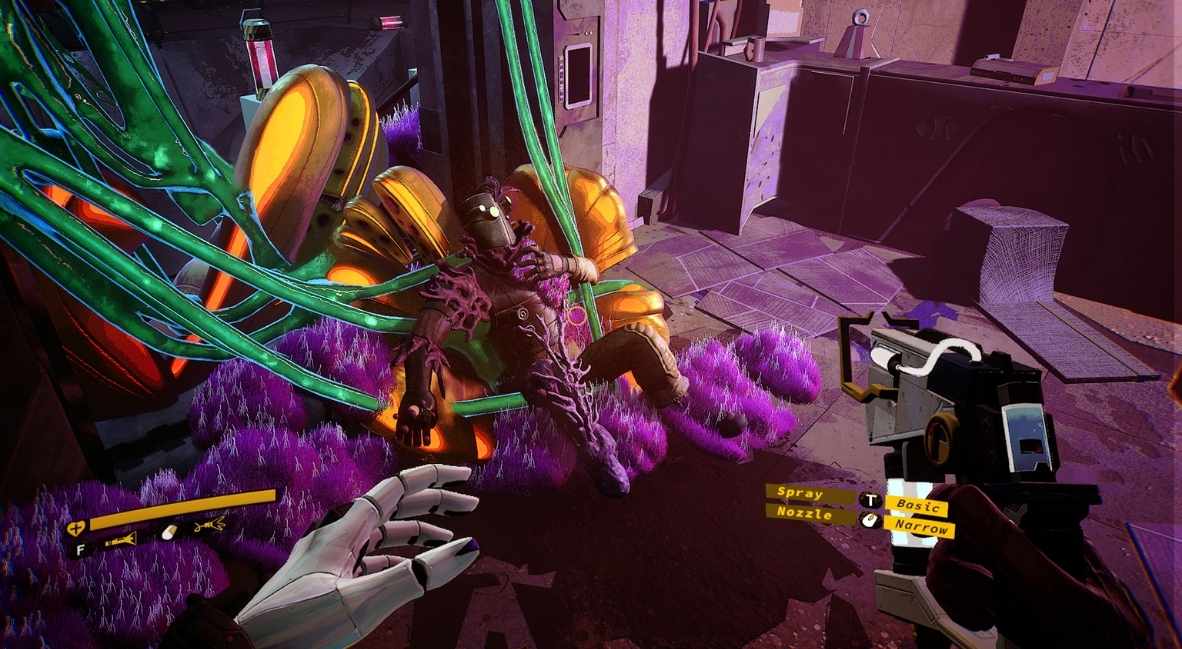
Joel Burgess answered next, “I’m the creative director of Ambrosia Sky, and I’ve been in that role before, technically, a couple of times, but I think it’s the first time my name and those words show up on the same line in a credits page. And it’s a mantle that I don’t know—I think it’s fair to say that I wear [the mantle] uncomfortably.”
He continued, “One thing I’ve learned is that Ambrosia Sky was an experiment. It’s one of the reasons why I take on the presumption that the creative director is the visionary and that the role of the creative director is to have this almost fully formed idea. And I think people did look at me on this project for that at times, and I failed them [in that aspect].”
“That’s why this is the lesson I will manifest as we continue working on Ambrosia Sky. In looking at it in full retrospect, my interpretation of the role here was not to direct the creativity of the game wholesale, but to direct the creativity of the people on the team, to be able to fill spaces and guide the flow, and hopefully have some synchronicity between the different conversations I’d have.”
Burgess’s response looked at what he could learn from his time on Ambrosia Sky and with his team. His vulnerability was a good reminder that humans make games. He continued, “The goal for me in my career has been to try to make myself the least smart person in the room and put myself in places where I can learn from people I think are better than me.”
“So, what I hope to learn from Ambrosia, but I don’t think I’ve learned yet, is whether this sort of thesis that I have about creative direction for something as collaborative by its nature as a game is right or wrong. I hope it’s right, and I hope that shows and what Ambrosia is,” he concluded.
Ambrosia Sky is a personal game, using sci-fi to explore vulnerability.
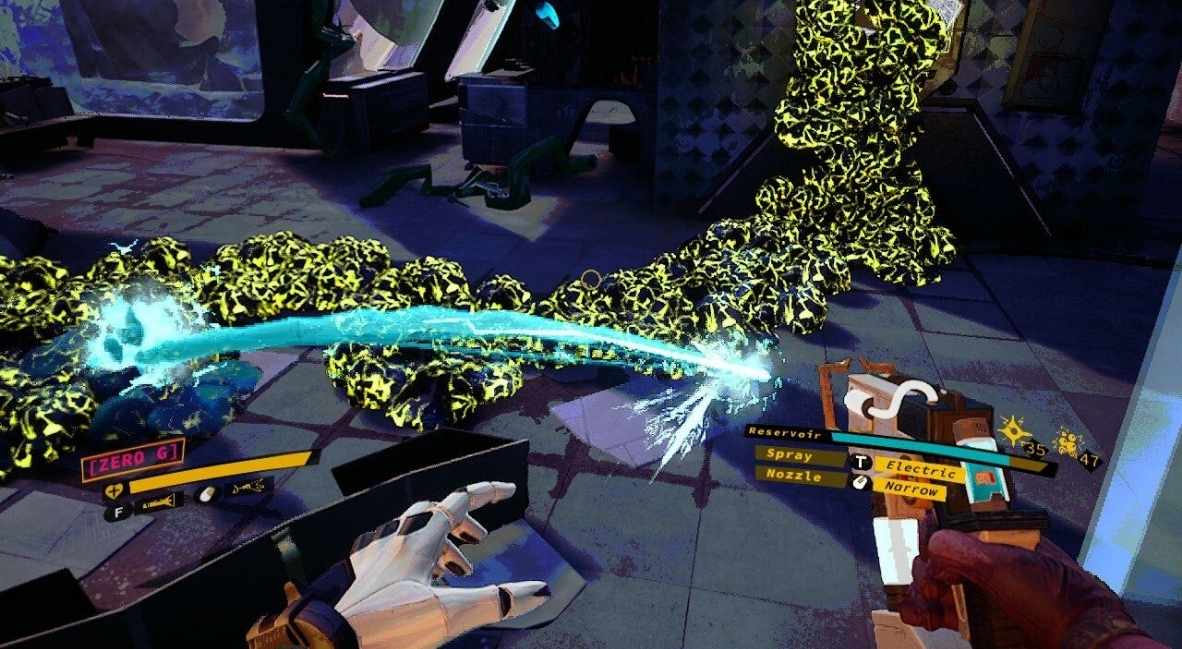
Switching gears, we began to talk about Ambrosia Sky’s emotional component. Yes, there is action, there is outer space, there are vibrant psychedelic colors, but there is also grief. We asked about balancing the emotional tone of Dalia’s journey with the visual art style of the game.
“I think a lot of it is really acknowledging that even in the worst feelings, those feelings are never just one thing,” the Narrative Director started. “The worst depressive episodes I’ve ever had, the worst grief I’ve ever had. In those moments, I felt other things as well. There’s still the mundane; there were moments of surprising levity that kind of exist within even the worst moments of my life.”
Tremblay continued, “I tried to apply a lot of that to the way Dalia reacts to these spaces, she’s recording calms for her scare partner Ma and she’s interacting with these people and she’s kind of like going through these emotions and all these emotions exist at the same time and I think acknowledging that hey we’re writing a somber game, a game about grief, but there’s all these other multifaceted emotions that exist within there let us then do okay how can we introduce levity right like Ma as a character is a little bit more removed and so he can be a little bit more of, comedic relief in some of his notes.”
Hearing Kaitlin Tremblay explain this, it made sense why Ambrosia Sky clicked for me. Grief and regret are ultimately two umbrellas that keep many emotions nestled underneath them. The game’s visual language and it’s narrative tone balance that while also paying homage to the complexities of feeling these strong states of being. But to be in balance, there also has to be a bit of humor.
Tremblay added, “Some of the characters you find in the world will hopefully be funny in the ways that they’ve responded to their life around them as well. And kind of like acknowledging the variety of emotions that exist even when you are grieving or depressed or sad or moving through things, I think we gave ourselves permission to just be more fully human if that makes sense.”
“When you try to bullet point it into whatever a Reddit post or press release needs, it’s like a sad cleaning simulator with fungi destruction. Still, I think that’s part of what I like about it. It creates a sort of weird umbrella that can encompass a wide range of people and outlooks.”
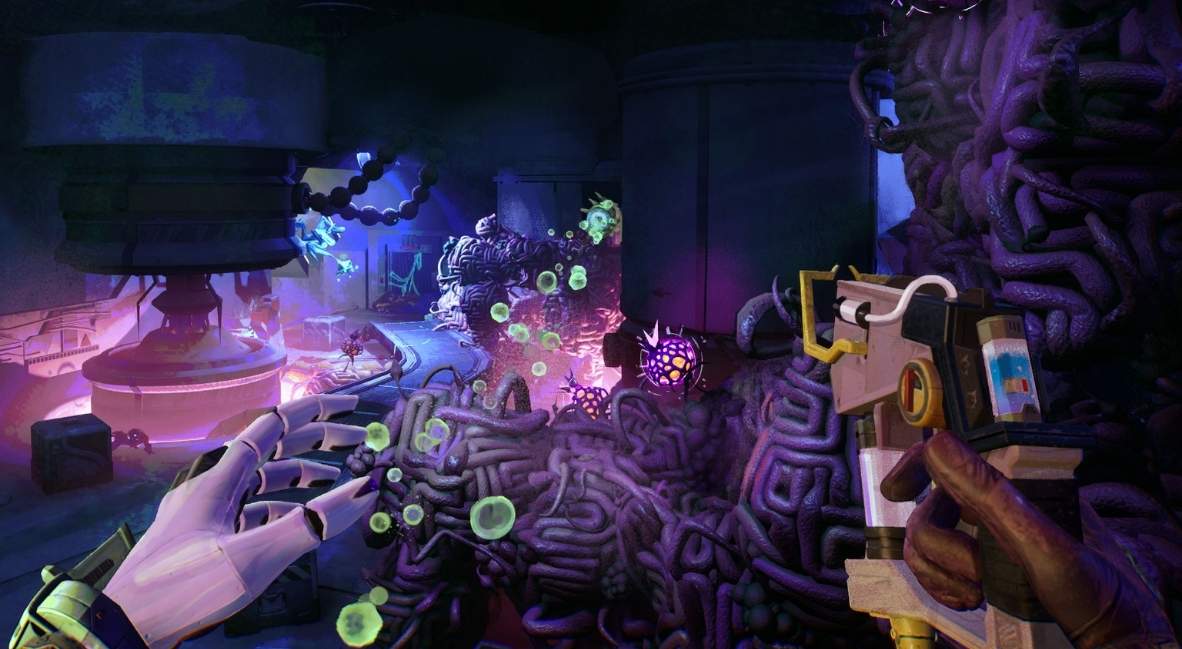
And despite taking place in outer space and embodying the science fiction genre, Ambrosia Sky is a fully human story. Burgess added to the conversation, “I think there’s something too that I think I had sensed in a way that I might not have been able to put words to it when we were making the decisions. But I’m seeing validated more as we’ve revealed the game, showed the game, and with Act One out now.”
“When you look at the very beginning of the game’s [development], there are big open questions like: ‘How much of a shooter is this game going to be?’ or ‘How much of an RPG might this game be?’ At the beginning of the game, it could have been anything. We really settled on some core character stuff and setting really early on, and when we were first experimenting and prototyping with the game, there were lots of questions. But those questions narrowed,” he said.
“There were points at which, when death rituals were really working well, the first time. We thought, should this game just be a walking simulator of purely death rituals? Then, people started calling Ambrosia Sky an immersive sim, so for us, we were like, okay, we’re going to go ahead and embrace it.”
“But I think one reason why it’s important the game landed the way we did, is this sense of pacing that we’re able to create through the traditional first-person, immersive sim-type level design, where you’re not always in those peaks of intensity that you get during a death ritual or when you’re getting hit by the voice acting from Dalia.”
Diving more into the development process, Buress continued explaining, “There are times when you’re in an event and trying to figure out a puzzle or deal with a nasty fungus or something like that, and we feel like those [moments] create space for reflection, introspection, just being lost in the music and stuff. And I think without those moments of almost distraction, you don’t actually get to inhabit where you are in the game.”
“I think this is where the sort of immersive sim part of it feels, maybe in retrospect, like something I could portray as a great creative director. Try to pursue? No, it’s more organic than that. But I think that is the difference between us, telling you the story of Dalia and telling you how Dalia feels, and more letting you actually be along for the ride and feel some of those feelings and apply them to your own life and your own thoughts, and in the spaces between,” Burgess concluded.
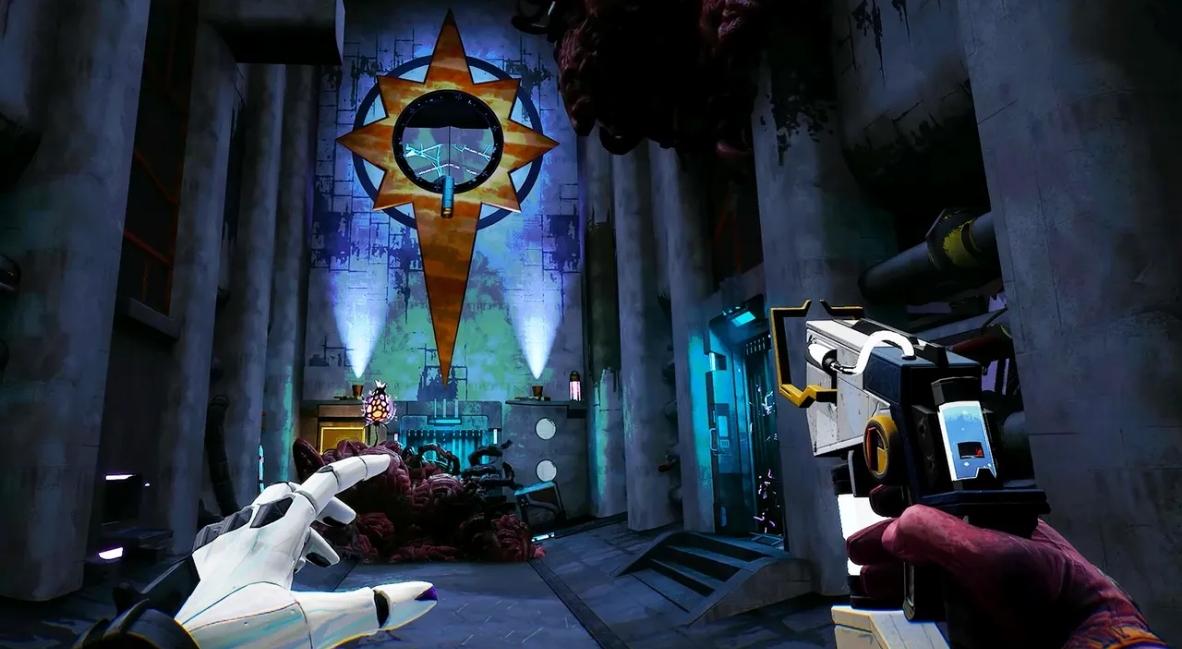
With our time coming to an end, all we had left was one question: What did they want players to take away after they completed Act One? And there couldn’t have been a better question to take advantage of the conversation we’d been having, but more importantly, highlighting the intimacy and vulnerability that comes in Ambrosia Sky’s storytelling.
Tremblay jumped in immediately, “I think a lot about this, actually. I think a lot about how I don’t really have a one set thing that I hope players feel. I could be like, I hope players finish this game and go and write their last will, or they go and do ‘this kind of thing,'” She said, jokingly.
She continued, “But that’s not really how I feel about it. I just hope players have been able to take what we have in Ambrosia Sky Act One and just kind of sit with it. [Ambrosia Sky] is just a place to put emotions that are hard to grapple with. The game talks about survivor’s guilt and acceptance and moving on and self-forgiveness and grief and all these things, right? And I just hope it becomes this place where players can just sit with the feelings that they have and work through them however they have to.”
As our last question, it’s only fitting that we look at the vulnerabilities that Ambrosia Sky asks you to have while exploring Dalia’s home. But it’s not a game about emotions we haven’t experienced. As both Buress and Tremblay noted throughout the interview, this isn’t just a sci-fi story; it’s a personal one.
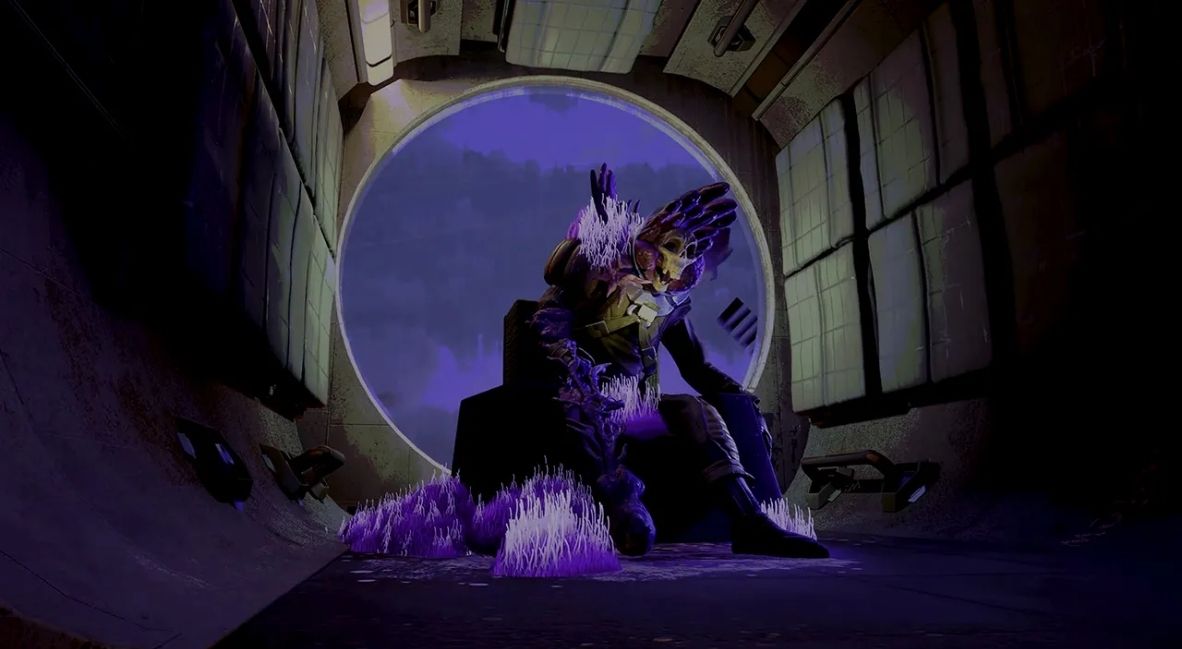
Joel Burgess added to Tramblay’s answer, “Even before Act One launched, I think we’d seen it with people’s responses to the demos or to hands-on demos we would give with press early on. People were already sort of taking from it what they would. We would have conversations after giving a demo at an event or something, where people would confide in a personal tragedy that they had gone through, or they’d say that Ambrosia Sky is really given meaning in a course [they] took in college about how people process grief.”
“It’s making me think about that now,” he continued. “And yeah, people may be like, ‘I should write my will’ and those sorts of things. I don’t know, I think there’s something special about it being a tone piece and being a bit of a mirror for people. I think—no, I hope that there are people who come to Ambrosia Sky because they saw something interesting or quirky in the gameplay trailer. I hope they want to play it because I think that the game is sort of the Trojan horse. [You start playing] and then we got you in the ‘feels’ and got you thinking about things you might not have.”
“[Alternatively,] people who come to it who are looking for [emotion] might find something special in the gameplay that they weren’t looking for. But I think that’s what is nice about Ambrosia Sky being this weird chimera mash of [genre], because yeah, it’s a sort of game where when you try to bullet point it into whatever a Reddit post or press release needs, it’s like a sad cleaning simulator with fungi destruction. Still, I think that’s part of what I like about it. It creates a sort of weird umbrella that can encompass a wide range of people and outlooks.”
When all is said and done, Ambrosia Sky is still only in Act One. Even so, the emotional weight that the team at Soft Rains aims to help players explore with the title is necessary. As we step back and look at the idea of coming home, in a time where people in the US are being ripped from their homes, “homecoming” takes on an even more important meaning. For diasporic communities, for those who worry about losing theirs, and even those of us out there looking to go home for the holidays. But that weight is one that Soft Rains has tried to carry with you, and they’re doing that with respect and care.

